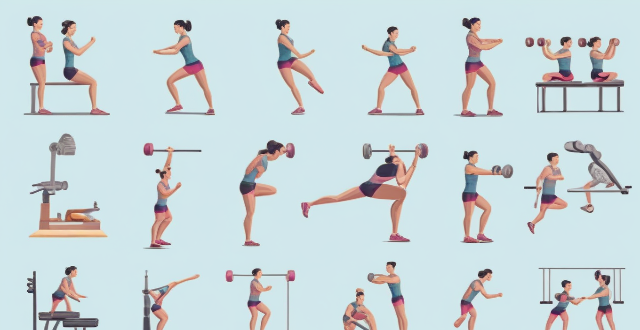Performance Exercise

How does hydration affect exercise performance
Hydration is crucial for optimal exercise performance. Dehydration can cause fatigue, headaches, and decreased performance. To maintain hydration levels, drink water before, during, and after exercise, and consume electrolyte-rich drinks like sports drinks or coconut water. Eating foods that contain water or electrolytes can also help. Proper hydration ensures our bodies are functioning at their best.

How does dehydration during exercise affect performance and physiological responses ?
Dehydration during exercise can significantly impact performance and physiological responses. It decreases blood volume, impairs thermoregulation, affects cognitive function, increases heart rate and blood pressure, causes respiratory alkalosis, leads to muscle cramping and stiffness, and alters metabolic processes. Athletes should stay hydrated to avoid these negative effects.

How does exercise physiology contribute to understanding the aging process and its effects on physical performance ?
Aging is a complex biological process that affects all living organisms, involving a gradual decline in physical and mental functions over time. Exercise physiology, the study of how the body responds to exercise, plays a crucial role in understanding the aging process and its effects on physical performance. As we age, our muscle mass and strength tend to decrease, cardiovascular fitness reduces, and joint pain and stiffness become more common. Exercise physiology helps us understand how the body adapts to regular physical activity at different stages of life, preventing age-related declines and promoting healthy aging through targeted exercise programs.

How can nutrition affect an athlete's performance ?
Nutrition plays a pivotal role in an athlete's performance, providing essential energy, aiding recovery, and maintaining overall health. A balanced intake of macronutrients, such as carbohydrates for immediate energy, proteins for muscle repair and growth, and fats for long-term energy, is crucial. Micronutrients like vitamins and minerals also contribute to metabolic functions and electrolyte balance. Hydration is vital for fluid balance and preventing performance decline due to dehydration. Timing of nutrient intake, before, during, and after exercise, significantly impacts performance and recovery. Strategic dietary planning, including periodized nutrition and anti-doping compliance, ensures athletes meet their specific needs and maintain clean sport standards. Overall, a well-structured nutritional plan can enhance athletic performance and success in sports.

What is the role of exercise physiology in improving athletic performance ?
Exercise physiology, a branch of science that studies the body's responses to physical activity, is crucial for improving athletic performance. It helps in understanding the body's reaction to different exercises, training methods, and recovery strategies. By applying these principles, athletes can optimize their training programs and enhance their results in sports. The text discusses the following key points: 1. **Understanding the Body's Response to Exercise**: This includes the differences between aerobic and anaerobic energy systems and muscle fiber types, which are crucial for determining suitable exercises for various activities. 2. **Optimizing Training Programs**: Periodization, intensity, and volume are essential elements in planning effective training programs. 3. **Recovery Strategies**: Proper nutrition, sleep, and active recovery techniques aid in post-exercise recovery. 4. **Injury Prevention and Rehabilitation**: Biomechanics, strength, and flexibility training play significant roles in preventing injuries. In conclusion, exercise physiology provides valuable insights into how the body responds to various training stimuli and recovery strategies, allowing athletes to make informed decisions about their training programs. This knowledge enables them to improve performance, prevent injuries, and achieve their goals more effectively.

What is the relationship between exercise physiology and nutrition for athletes ?
The article discusses how exercise physiology and nutrition are interconnected for athletes, with each influencing the other. It defines exercise physiology as the scientific study of how the body functions during physical activity, covering areas like energy systems, muscle function, cardiovascular responses, respiratory functions, and thermoregulation. Nutrition for athletes involves strategic eating plans to enhance performance, aid recovery, and maintain overall health, focusing on macronutrients, micronutrients, hydration, and timing of intake. The intersection of these two aspects includes fueling performance, recovery and repair, hydration and thermoregulation, energy balance, supplementation, and dietary needs variation. A comprehensive understanding of both exercise physiology and nutrition is crucial for athletes to achieve peak performance.

What are the latest research findings in exercise physiology that can benefit amateur athletes ?
This text discusses the latest research findings in exercise physiology for amateur athletes, including the benefits of High-Intensity Interval Training (HIIT), recovery techniques, nutrition and hydration, and mental health strategies. Incorporating these findings can help amateur athletes improve their performance, prevent injuries, and achieve their fitness goals.

How does hydration impact athletic performance and health ?
Hydration is crucial for athletic performance and health. Adequate hydration maintains energy levels, muscle function, joint lubrication, heart rate, and cognitive function during exercise. Dehydration can lead to fatigue, muscle cramping, increased heart rate, impaired cognitive abilities, and decreased physical performance. Proper hydration also aids digestion, kidney function, skin health, immune system function, and body temperature regulation. Chronic dehydration can increase the risk of kidney stones, digestive issues, weakened immune system, and other health problems. Therefore, it is essential for athletes to stay well-hydrated to achieve optimal performance levels and support their overall health.

Can napping improve athletic performance ?
**Can Napping Improve Athletic Performance?** Napping is a common practice among athletes and non-athletes alike, but can it really improve athletic performance? Research suggests that napping can aid in physical recovery and enhance cognitive function. Physical Recovery: - **Muscle Repair**: Sleep produces growth hormone, aiding in muscle repair and growth. - **Reduced Inflammation**: Sleep reduces inflammation, leading to better recovery after exercise. Cognitive Function: - **Improved Focus**: A quick nap can improve focus and concentration for peak performance. - **Enhanced Learning**: Sleep consolidates memories, allowing athletes to learn from mistakes and improve skills faster. Effective Napping Tips: Timing: - **Power Naps**: Limit naps to 20-30 minutes to avoid deep sleep and feeling groggy upon waking. - **Timing Before Bedtime**: Avoid napping too close to bedtime to prevent disrupting the nighttime sleep cycle. Environment: - **Quiet and Dark**: Find a quiet, dark place to nap for better sleep quality. - **Comfortable Surface**: Choose a comfortable surface to prevent waking up with aches and pains. In conclusion, napping can improve athletic performance by aiding physical recovery and enhancing cognitive function. It's important to nap effectively by timing your naps appropriately and creating a comfortable environment.

What are the best sports nutrition supplements for enhancing athletic performance ?
The article discusses the importance of sports nutrition supplements in enhancing athletic performance. It highlights five key supplements that can help athletes improve their performance: 1. Protein Supplements: Essential for building and repairing muscles, protein supplements like whey, casein, and soy protein can support muscle growth, increase strength, and improve body composition. 2. Creatine Supplements: Popular among athletes for increasing muscle mass and improving performance during short, high-intensity exercise. Creatine also enhances recovery between workouts. 3. Beta-Alanine Supplements: An amino acid that increases muscle carnosine levels, beta-alanine can improve endurance capacity during high-intensity exercise, reduce fatigue, and enhance muscle strength and power. 4. Caffeine Supplements: A natural stimulant that can increase energy levels, reduce fatigue, improve mental focus, and enhance endurance capacity during prolonged exercise. 5. Multivitamins and Minerals Supplements: Important for overall health and well-being, multivitamins and minerals can help prevent nutrient deficiencies that could impair performance and enhance immune function and recovery from training. The article emphasizes the importance of choosing safe and effective supplements that meet the specific needs of an athlete and consulting with a healthcare professional or registered dietitian before starting any new supplement regimen.

What is the ideal meal timing for optimal sports performance
The ideal meal timing for optimal sports performance is crucial for athletes to maximize their potential. Proper nutrition can help improve endurance, strength, and overall performance during physical activities. Key points to consider when planning meals include eating a pre-workout meal containing carbohydrates, protein, and healthy fats 2-3 hours before exercise; staying hydrated throughout the day; consuming simple carbohydrates during longer workouts; eating a post-workout meal rich in protein and carbohydrates within 30 minutes after exercising; and avoiding eating too close to workout time. By following these guidelines, athletes can ensure they have the necessary fuel for their bodies to perform at their best.

Can exercising during lunch breaks improve work performance ?
Exercising during lunch breaks can improve work performance by boosting energy levels, reducing stress and anxiety, improving mood, enhancing cognitive function, and promoting better sleep quality. To incorporate exercise into your routine, plan ahead, set realistic goals, find a workout buddy, be mindful of time, and make it fun!

Can certain vitamins improve athletic performance ?
Vitamins play a crucial role in various bodily functions, including metabolism, immunity, and tissue repair. Athletes often seek to optimize their performance by ensuring they have adequate vitamin intake. Certain vitamins like B-complex, Vitamin D, Vitamin C, and vitamins A, C, and E can improve athletic performance by supporting energy metabolism, muscle function, recovery, and immunity. However, it's essential to ensure an adequate intake through a balanced diet and consider supplementation only when necessary and under professional guidance. The key is to find the right balance that works for each individual athlete's unique needs and circumstances.

Why is it important to warm up before exercise ?
Warming up before exercise is crucial for preparing the body, preventing injuries, and improving performance. Benefits include increased blood flow, raised body temperature, loosened joints, prepared nervous system, reduced cardiovascular risk, and enhanced workout results.

Is it better to do aerobic exercise in the morning or evening ?
The best time to do aerobic exercise depends on your personal preferences, schedule, and individual needs. Morning exercise can boost metabolism, improve mental clarity, and increase energy levels, but it may also be challenging to wake up early enough and could lead to lower performance and joint stiffness. Evening exercise can reduce stress, improve flexibility, and promote relaxation, but it may interfere with sleep, have time constraints, and cause fatigue. It's essential to listen to your body and choose a time that works best for you while maintaining consistency in your fitness routine.

How important is nutrition in optimizing athletic performance at a competitive level ?
Nutrition is crucial for athletic performance, providing energy, aiding recovery, and maintaining health. Key aspects include consuming carbohydrates for energy, proteins for muscle repair, staying hydrated, obtaining necessary micronutrients from a varied diet, timing nutrient intake around exercise, and personalizing nutrition plans. These practices help athletes maximize their training and competitive outcomes.

What are the most common metrics used in analyzing sports performance ?
Analyzing sports performance is crucial for athletes, coaches, and teams to improve their skills, strategies, and overall performance. There are several metrics used to evaluate different aspects of sports performance, including time-based metrics such as speed and pace; distance-based metrics such as distance covered and displacement; power-based metrics such as peak power and power endurance; technique-based metrics such as form analysis and biomechanical analysis; physiological metrics such as heart rate and VO2 max; and mental metrics such as mental toughness and motivation levels. These metrics can help athletes and coaches identify areas for improvement and develop effective training programs to enhance performance.

How can I improve my athletic performance through diet
Improving athletic performance through diet involves eating a balanced diet, increasing protein intake, consuming plenty of fruits and vegetables, drinking enough water, avoiding processed foods, eating before training or competition, and considering supplements. A balanced diet includes carbohydrates, proteins, and healthy fats in the right proportions. Protein is essential for building muscle and repairing damaged tissues, while fruits and vegetables are rich in vitamins, minerals, and fiber. Drinking enough water is crucial for staying hydrated during exercise. Avoiding processed foods can prevent harm to your performance and health. Eating before training or competition can provide energy and prevent fatigue. Supplements such as whey protein powder, amino acids, and BCAAs can improve performance but should be taken under the guidance of a nutritionist or doctor.

How does music affect athletic performance ?
Text is about how music can affect athletic performance. It explains the ways in which listening to music while exercising or competing can increase motivation, improve focus, reduce the perception of effort, and distract from pain and fatigue, leading to better performance and results.

What are the best ways to enhance athletic performance ?
Improving athletic performance involves a combination of physical, mental, and lifestyle factors. Here are some strategies that can help athletes reach their full potential: ## Physical Training ### Strength and Conditioning - Incorporating weight training helps build muscle strength and endurance. - Plyometrics exercises like box jumps and bounding improve power output, crucial for many sports. ### Technique and Drills - Perfect practice makes perfect; focusing on the quality of movements rather than just quantity. - Practicing game scenarios can enhance decision-making skills under pressure. ### Recovery - Light activities like walking or swimming can aid recovery. - Stretching and foam rolling help reduce muscle soreness and improve flexibility. ## Nutrition and Hydration ### Diet - Consuming a mix of proteins, carbohydrates, and healthy fats supports energy levels and recovery. - Drinking enough water is essential for maintaining performance and preventing cramps. ### Supplementation (When Needed) - Sports drinks during prolonged exercise can replenish electrolytes and provide energy. - Post-workout protein shakes can aid in muscle repair. ## Mental Preparation ### Visualization - Seeing yourself succeed in your mind's eye can boost confidence and focus. - Setting clear, achievable goals provides direction and motivation. ### Mindfulness and Stress Management - Meditation can reduce anxiety and improve concentration. - Controlled breathing can lower stress levels before and during competition. ## Lifestyle Habits ### Sleep - Athletes need adequate rest to recover physically and mentally. - Maintaining a consistent sleep schedule optimizes rest. ### Avoiding Negative Habits - Substances can impair judgment and harm performance. - High stress levels can negatively impact both physical and mental health.

What role does nutrition play in a comprehensive sports training program ?
Nutrition is a crucial component of sports training, providingNutrition is a crucial component of sports training, providing repair, boosting immunity, providing energy, supporting recovery and repair, boosting immunity, and maintaining hydration. Athletes should consume a balanced diet with carbohydrates, proteins, and fats for optimal energy production. Pre-exercise meals should focus on carbohydrates, during-exercise snacks can include simple sugars for quick energy release, and post-exercise meals should combine carbohydrates and protein for recovery. Proper nutrition strategies can improve athletic performance and overall well-being.

Do different genres of music have varying effects on sports performance ?
Music is a powerful tool that can influence our mood, motivation, and overall performance in various activities, including sports. The question arises: do different genres of music have varying effects on sports performance? Let's delve into this topic to find out. ### Motivational Aspect - **Upbeat Music**: Fast-paced music with a high tempo, such as rock or electronic dance music, can increase energy levels and provide motivation during workouts or competitions. - **Relaxing Music**: Slow-tempo music like classical or instrumental tracks may help athletes relax and focus on their technique rather than intensity. ### Physical Response - **Heart Rate**: Upbeat music can increase heart rate, preparing the body for more intense physical activity. - **Muscle Response**: Some studies suggest that certain genres of music can affect muscle activation and coordination. ### Mental Focus - **Concentration**: Music without lyrics or with less distracting elements can help maintain focus during repetitive tasks or endurance events. - **Mental Toughness**: Aggressive or empowering music can boost mental toughness, helping athletes push through difficult moments. ### Recovery Process - **Relaxation**: Genres like ambient or yoga music can aid in recovery by reducing stress and promoting relaxation post-exercise. ### Genre-Specific Effects - **Rock/Pop**: Ideal for high-intensity workouts where an energy boost is needed. - **Classical/Instrumental**: Suitable for activities requiring precision and concentration. - **Hip-Hop/Rap**: The strong beats can serve as a rhythmic guide for exercises requiring timing and coordination. - **Electronic Dance Music (EDM)**: Suitable for interval training due to its ability to sustain high energy levels. - **Ambient/Yoga Music**: Helpful in recovery sessions by promoting relaxation and reducing tension.

Is there a connection between physical fitness levels and academic performance in children ?
This text discusses the potential correlation between physical fitness levels and academic achievement in children, highlighting research findings that suggest a positive relationship. It outlines various mechanisms through which physical activity may improve cognitive functions and behavior, leading to better academic performance. The text also emphasizes the importance of incorporating physical education into school programs and encourages family and community involvement in promoting physical activities among children.

How does regular exercise contribute to occupational health ?
**Summary: Regular Exercise in Occupational Health** The article discusses the role of regular exercise in promoting occupational health, which encompasses physical, mental, and social well-being. It outlines the benefits of regular physical activity, including improved stamina, reduced injury risk, enhanced immune system, stress reduction, better cognitive function, increased resilience, team building, and a healthy work-life balance. The text emphasizes that incorporating exercise into daily routines can significantly enhance job performance and overall employee well-being. Employers are encouraged to implement wellness programs with exercise initiatives to foster a healthier and more productive workforce.

How does stress management through exercise impact professional well-being ?
The impact of stress management through exercise on professional well-being is significant and positive. Professional well-being refers to overall satisfaction and happiness in the workplace, which includes job satisfaction, work-life balance, relationships with colleagues, and personal growth opportunities. Exercise is a proven method for managing stress, as it releases endorphins and reduces levels of stress hormones like cortisol and adrenaline. Regular physical activity also promotes better sleep, essential for stress management. The impact of exercise on professional well-being includes improved mental health, enhanced cognitive function, increased energy levels, better work-life balance, and improved interpersonal relationships at work. By incorporating regular physical activity into our daily routine, we can achieve these benefits, leading to increased productivity, reduced absenteeism, and improved job performance. Therefore, organizations should promote exercise among their employees as part of their overall wellness program.

How does exercise improve cognitive function ?
Exercise plays a crucial role in enhancing cognitive function, including memory, attention, and problem-solving skills. It promotes brain plasticity, increases blood flow and oxygenation, reduces inflammation, and improves sleep quality. Incorporating exercise into your routine can be done through various activities such as running, swimming, or yoga. Start small and gradually increase intensity and duration, find enjoyable activities, incorporate mindful movement, make it social, set realistic goals, and consult with a professional if needed.

Can taking sports nutrition supplements compensate for a poor diet and lack of exercise ?
Sports nutrition supplements cannot fully compensate for a poor diet and lack of exercise. While these supplements can provide certain nutrients essential for athletic performance, they cannot replace the overall benefits of a healthy lifestyle. A balanced diet and regular exercise are crucial for maintaining good health and supporting athletic performance. Supplements should be used cautiously and with guidance from a healthcare professional to ensure they complement your overall lifestyle rather than replace it.

What is sports biomechanics and how does it apply to athletic performance ?
Sports biomechanics is a subdiscipline that applies mechanics principles to study human movement in sports and exercise. It focuses on how forces and motion affect the body during physical activity, combining knowledge from physics, biology, engineering, and other areas for understanding and improving athletic performance. Key concepts include kinematics, kinetics, and dynamics. Applications of sports biomechanics include injury prevention through gait analysis and movement optimization; technique improvement via motion analysis and force plates; equipment design considering ergonomics and material science; training programs that incorporate resistance, flexibility, and stability training; performance analysis using data analysis and feedback systems; and recovery strategies like physical therapy and rest-activity balance.

What is the importance of nutrition in sports medicine ?
The article discusses the importance of nutrition in sports medicine, emphasizing its role in providing energy for exercise, preventing injuries, enhancing performance, aiding recovery, supporting the immune system, and contributing to mental well-being. It highlights the specific nutrients that are crucial for athletes, such as carbohydrates for energy, protein for muscle repair, iron for oxygen transport, B vitamins for energy conversion, and antioxidants for cell protection. The article also emphasizes the need for a balanced diet to prevent illnesses and improve overall health. It suggests that athletes should work with sports nutritionists to develop personalized diet plans that meet their specific needs and goals.

How does lack of sleep impact athletic performance ?
The text discusses the importance of sleep for athletes, explaining that adequate sleep is essential for muscle recovery and repair, cognitive function, and regulation of energy levels. Lack of sleep can negatively impact athletic performance by decreasing endurance, impairing reaction time and coordination, increasing the risk of injury, altering mood and mental health, and reducing motivation and focus during training or competition. The article concludes that prioritizing sleep as part of an athlete's overall training regimen is crucial for optimal performance.